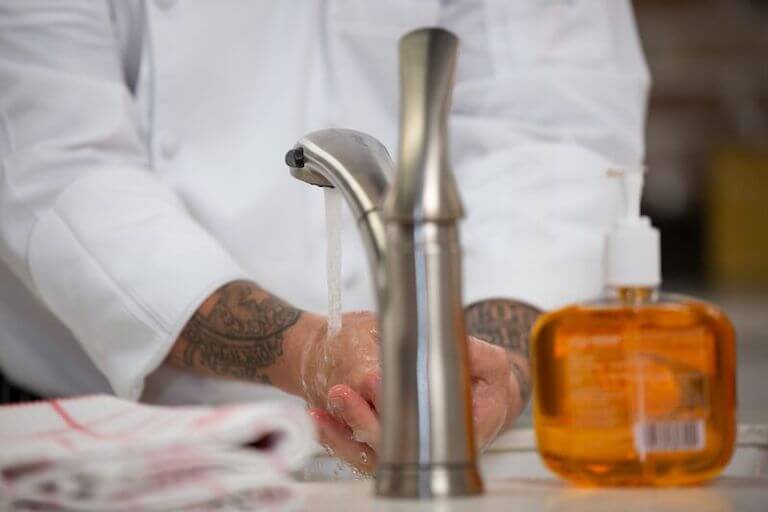Listen to This Article:
Sanitation has always been important in bakeries and other food service establishments, but the COVID-19 pandemic highlighted just how crucial proper sanitation could be to a bakery’s success. Whether you’re operating a large-scale bread bakery or baking cookies out of your home, keeping a bakery clean can help keep your customers safe and allow your business to thrive.
Read on for a few tips on bakery cleaning and sanitation.
A Visibly Clean Bakery Is a Marketing Advantage
When customers walk in your bakery’s door or see photos of your establishment online, they want to feel good about eating the baked goods you produce. Part of establishing this trust is maintaining a visibly clean and tidy bakery.
That’s why sanitation practices that keep the workplace clean and orderly have always been essential. They can help protect employees and customers, aid in maintaining regulatory compliance, and allow your bakery to turn out consistently great products.
Since sanitation and food safety is such an important part of running a successful bakery, students in Escoffier’s baking and pastry school can explore sanitation basics in one of their first courses, Foundations, Or Fundamentals, of Baking and Pastry. As students progress through their courses, they have the opportunity to continue to practice keeping their workspaces clean and producing baked goods with food safety in mind.
Even if you’re not a culinary student, you should still focus on proper sanitation. Whether you’re new to the pastry world or have been baking for years, remember these guidelines as you practice keeping a bakery clean.
Personal Hygiene Is Crucial
Good sanitation starts with every individual who works in a bakery. Careful attention to personal hygiene makes all the difference in keeping food free of any pathogens that staff members could carry on their bodies, hair, or clothes. Every bakery should establish and enforce strict standards of cleanliness for all employees, especially those who come into direct contact with ingredients or finished items.

Common rules for bakery workers include directives to always come into the business wearing clean clothing and keep a hair net or hat on throughout the day. Another important element is handwashing—all employees must wash their hands before touching ready-to-eat items such as pastries or bread, before food preparation, after handling raw ingredients, and after they visit the bathroom. Employees should also make sure to properly bandage any open wounds in order to prevent spreading harmful bacteria.
Wash Utensils and Surfaces
Dirty kitchen utensils or surfaces that come into contact with food, the floor, and other potential contaminants can become major hazards. Cooking and baking professionals always have to be on the lookout for cross-contamination, which can be dangerous to customers. Carelessly using the same tools or cutting boards for different tasks without cleaning them might lead to foodborne illnesses or unexpected allergic reactions.
In addition, any items that are left dirty might attract insects or rodents which can spread additional diseases. Thorough, regular cleaning is an essential line of defense against foodborne illness, allergic reactions, and other serious issues.
Stay on Top of Equipment Maintenance
Bakers rely on an array of machines, such as mixers, dough shelters, and bread slicers, to prepare their goods efficiently. While washing mixing bowls and cleaning off surfaces is a daily task in many bakeries, weekly or monthly deep cleaning tasks should also be a part of keeping equipment sanitary.
Set a schedule so you remember to complete deep cleaning tasks such as scouring your oven and greasing the hinges of your mixer. Not only can these tasks help keep your bakery clean, but they might also prevent equipment malfunction and hazards such as fires.

If you bake bread or other yeasted baked goods, it’s particularly vital to keep proofing cabinets clean. The warm environments that are ideal for allowing bread to rise can also be hospitable spots for bacteria. Therefore, bakeries should have a policy of washing out proofing cabinets with warm water and mild soap on a daily basis.
Cleaning out storage and properly disposing of waste keeps a bakery running smoothly.
Properly Store All Food
Since you’ll be storing many temperature-sensitive ingredients in the refrigerator or freezer, you must keep these units clean. To prevent food from going bad, ensure you are keeping cold storage at the right temperature. It’s a good practice to monitor and record the temperature each day, so you can address any issues as soon as they arise.
Other best practices include properly sealing food before placing it into cold storage, dating all food, and turning off the lights when you exit a walk-in cooler. By following these practices, you may be able to limit the amount of food spoilage and therefore food waste. However, it is still good practice to clean out cold storage units at least once per week by taking inventory, removing any spoiled food, and cleaning surfaces with warm water and detergent or a food-safe disinfectant spray.
Keeping a Bakery Running Means Keeping a Bakery Clean
Running or working in a bakery requires a diverse range of skills. Not only do you need to know how to handle ingredients and work with different flavors, but you also need to understand topics like sanitation and customer service.

Take the Culinary Career Survey
We’ve compiled a checklist of all of the essential questions into one handy tool: career options, culinary interest surveys, educational opportunities, and more.
Escoffier’s baking and pastry programs can introduce students to a wide range of topics, including global cuisine, food safety, and bread baking fundamentals. If you’re interested in furthering your skills as a baker, contact us to learn if baking school could be for you.
Enjoyed this article? Here are a few more to consider:
- What Are the Baking and Pastry Arts…And Is It a Career for You?
- Building an Online Pastry Shop
- Six Skills That Every Baker Should Have
*Information may not reflect every student’s experience. Results and outcomes may be based on several factors, such as geographical region or previous experience.
This article was originally published on May 31, 2018, and has since been updated.

